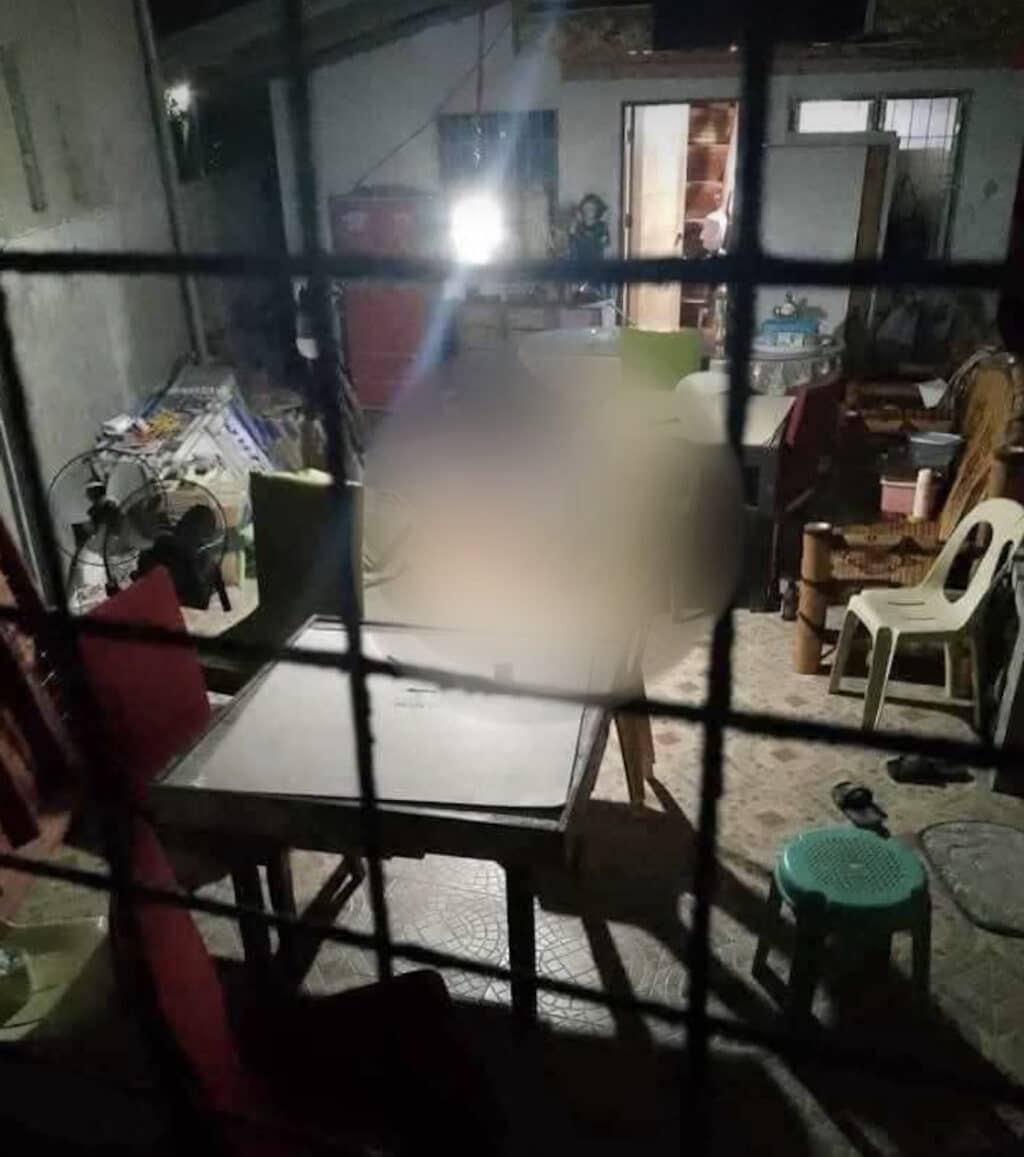Family violence in Cebu: Why fathers often initiate killings
Forensic psychologist unravels triggers behind recent family killings in Cebu
CEBU, Philippines — Family violence has taken a disturbing turn in Cebu, with fathers alarmingly at the center of recent tragedies.
These incidents, often rooted in financial strain, unresolved conflicts, and cultural pressures, reveal the deep-seated vulnerabilities within Filipino family dynamics.
Just recently, financial troubles, deteriorating health, and family conflicts drove a 62-year-old retired seaman to commit a violent act. On December 15, in Barangay Linao, Talisay City, he shot and wounded his 60-year-old wife and two adult children.
In another case, in Carcar City, a 64-year-old man fatally shot his girlfriend and her 14-year-old daughter during an alcohol-fueled argument. Meanwhile, in Barangay Sta. Cruz, Ronda town, southwestern Cebu, a father-son argument over debt escalated tragically on November 1, when a 29-year-old son was allegedly stabbed to death by his father.
Earlier in the year, on March 25, a family dispute in Barangay Lahug, Cebu City, resulted in bloodshed when a father fatally shot his son following a heated verbal exchange.

This is the area where a 38-year-old mother and her 14-year-old daughter were shot dead allegedly by the mother’s live-in partner in Carcar City last December 11. | Contributed photo via Paul Lauro
Understanding the root causes
But what exactly drives men to such extreme actions? The cases above are not isolated incidents but part of a disturbing trend of family violence that demands deeper understanding and action.
Each case not only highlights the devastating loss of life but also the lasting psychological scars left on families, particularly children, who must contend with the trauma of seeing their loved ones turn to violence.
They have prompted an examination of the underlying causes of these tragedies and, most importantly, what compels men, often husbands or fathers, to commit violent acts against their loved ones.
In an exclusive interview with CDN Digital, forensic psychologist and university professor Dr. Argel Bondoc Masanda laid out a sobering analysis of the underlying triggers of family violence in the Philippines.
He cited financial strain, infidelity, personality conflicts, and unresolved disputes as the leading causes.
The role of Filipino family dynamics
According to Masanda, the structure of the Filipino family, particularly the traditional role of fathers as primary breadwinners, significantly influences family dynamics.
“Financial difficulties top the list as the most common cause of marital disputes in the country. But these problems rarely exist in isolation. They often interact with personality issues or external stressors, creating an environment where violence can erupt,” he said.
Masanda explained that financial stress, compounded by societal expectations placed on fathers, contributes to emotional vulnerabilities. In rural areas, such pressures often manifest as impulsive and stubborn reactions to minor provocations.
READ MORE:
Talisay: Why retired seaman shot and wounded his wife, 2 children
Father jailed for gunning down son in Lahug, Cebu City
Men now at higher risk for suicide
When asked whether these emotions were valid, Masanda acknowledged that emotions were a natural and valid part of being human. However, he said that the actions taken in response to those emotions might not always be justified.
Masanda stated that it would be crucial to manage anger constructively and cautioned against impulsive actions that could cause harm.
“Filipino men grow up with the idea that they must be strong providers and should never show weakness. This cultural pressure makes it hard for them to express vulnerability or seek help, leading to bottled-up frustrations that often explode in violent ways,” he said.
While financial problems are often present in such cases, it is important to note that the majority, if not all, of these cases in the Philippines are linked to financial difficulties.
However, Masanda clarified that poverty alone does not directly cause violent crime; if it did, we would see far more widespread incidents of violence in the country.
“Poverty is not a cause to result in crime. Because if poverty is the cause, then how many Filipinos should be committing crimes?,” he said.
“Filipino men grow up with the idea that they must be strong providers and should never show weakness. This cultural pressure makes it hard for them to express vulnerability or seek help, leading to bottled-up frustrations that often explode in violent ways.”
Macho mentality and its implications
Beyond financial strain, another critical factor is the cultural expectation placed on men. This pressure is compounded by a prevailing ‘macho mentality,’ which Masanda identifies as a key influence on violent behavior in the family.
He explained that macho mentality was characterized by a rigid belief in traditional masculine roles, where men would be expected to be dominant, tough, and in control, often leading to harmful behaviors and attitudes in relationships.
“Actually, there are papers presented in some of the conferences I have attended in the past that even among millennials, the idea of macho mentality is still strong,” he said.
Masanda warned that this mentality not only aggravated emotional struggles but also contributed to an environment where dominance was asserted through aggression.

Dr. Argel Bondoc Masanda RPSY, RPM, LPT, RGC, the first Filipino psychologist to earn a doctorate degree in Forensic Psychology, discusses fathers and family violence. | Contributed photo
Low self-regulation and alcohol use
Personality traits such as low self-control or poor self-regulation are critical factors in family violence, according to Masanda. Individuals with these traits often struggle to manage their emotions. When combined with a macho mentality, the likelihood of violent behavior significantly increases.
Masanda explained that this mindset is rooted in a desire to assert dominance. For those with these traits, aggression becomes a perceived tool for control. He described this volatile combination as a “recipe for criminal behavior,” where impulsive emotions and ingrained cultural expectations fuel acts of violence.
“If they cannot regulate their emotions, and you couple that with a macho mentality, they think that if you’re angry, you need to show you’re angry. Our brain interprets this as a way to impose dominance over our surroundings. If you’re not going to follow me, I need to show my aggression so I can dominate you,” he said.
Masanda added that while most acts of violence were impulsive and driven by overwhelming emotions, some cases involved individuals with antisocial personality traits, where violence was premeditated and devoid of remorse.
Masanda also pointed out that alcohol often acts as a catalyst in such incidents. Many Filipino men turn to alcohol as a coping mechanism, which impairs judgment and lowers inhibitions, creating a volatile mix of stress, cultural pressures, and impaired decision-making.
“Alcohol is often a common denominator in these cases. Many Filipino men use it as a coping mechanism, which only lowers inhibitions and clouds judgment further. It’s a dangerous cocktail when stress, cultural expectations, and alcohol collide,” he said.
Biological and cultural factors
Biological and cultural factors also interplay to contribute to male aggression. Masanda noted that higher testosterone levels predispose men to aggression, while societal norms often permit men to express frustration more freely within the household, sometimes culminating in violence against family members.
Cultural expectations exacerbate this issue by discouraging men from showing vulnerability.
“In our society, men are often pressured to appear tough and strong, with no room to express emotion or weakness. This creates a huge burden, especially for fathers, to keep their feelings bottled up,” Masanda observed.
From an evolutionary perspective, he explained that men’s brains are hardwired to assess and respond to danger—a trait rooted in early human development.
“One major difference between men and women is that men are neurologically predisposed to confront and respond to threats in their environment,” Masanda said.
He noted that this heightened focus on assessing danger has, over time, shaped male behavior to be more aggressive in comparison to women, who tend to excel in processing finer details that men often overlook.
Masanda further explained the role of hormonal differences, where he noted that men naturally have higher testosterone levels than women. He explained that this biological factor predisposes men to greater aggression, as testosterone, a key hormone in the body, is a primary driver of aggressive tendencies.
From a sociological perspective, Masanda said that mental health remains a largely taboo subject in the Philippines, particularly among men and fathers.
He attributed this to entrenched cultural norms that equate masculinity with toughness and emotional suppression.
“Our culture largely resists seeing mental health as a normal concern for men. Many fathers feel they cannot be vulnerable about their mental health,” he said.
Identifying red flags and effects
Meanwhile, when asked about potential red flags that may indicate someone is at risk of committing domestic violence, Masanda identified low self-regulation—an inability to control thoughts, emotions, and actions—as one of the biggest warning signs.
He explained that this lack of control could escalate conflicts into violence, particularly when combined with personality traits like impulsivity or dominance.
“The perpetuation of the wrong mentality aggravates our susceptibility to commit crimes,” he said.
In discussing family violence, Masanda clarified that not all incidents result in fatalities. While some victims survive, they often face significant psychological challenges in the aftermath of traumatic events.
He cited the recent case in Talisay City, involving a retired seaman who injured his wife and two children, as an example.
He said providing psychological debriefing to survivors would be essential to address the emotional impact of trauma early, thus reducing the risk of developing psychological disorders such as post-traumatic stress disorder (PTSD).
“The perpetuation of the wrong mentality aggravates our susceptibility to commit crimes.”
Without timely intervention, survivors may grapple with insidious psychological issues, including survival guilt, which often emerges months after the incident.
He explained that survival guilt is a common emotional response, even when family members retain residual affection for those involved in the tragedy.
Psychological debriefing, he noted, plays a vital role in helping survivors process these emotions, thereby preventing more severe psychological disorders.
Moreover, children in their formative years, typically aged 4 to 9, are particularly vulnerable to mimicking observed behaviors, Masanda warned.
However, he clarified that adults would be less likely to imitate violent actions and would be more prone to developing trauma as a result of their experiences.
He also explored the interplay of genetic and environmental factors in influencing criminal behavior. While certain personality traits linked to criminal tendencies can be hereditary, Masanda noted the role of environmental factors in shaping outcomes.
“A supportive and mentally healthy environment can counteract genetic predispositions and prevent these tendencies from manifesting as criminal behavior,” he said.
The justice system and family violence
To curb violence against families, particularly women and children, the Philippine justice system upholds Republic Act 9262, otherwise known as the Anti-Violence Against Women and their Children Act of 2004. It seeks to address the prevalence of violence against women and children. (VAWC), abuses on women and their children by their intimate partners.
According to Masanda, this legislation serves as a robust and equitable framework for protecting vulnerable individuals and ensuring justice. However, he criticized inefficiencies in the judicial process, describing it as overly bureaucratic and slow.
“In the Philippines, we are too bureaucratic in the sense that we cannot expedite the process of handling a case,” he observed.
He noted systemic issues, such as public complacency and corruption, which worsen delays.
“Many Filipinos believe there is no case if there is no complaint,” he said.
He also added that some view the system as favoring individuals with influential connections.
Solutions and community involvement
Despite the presence of a strong legal framework to combat violence against women and children, Masanda emphasized that proactive measures could prevent families from reaching such dire situations. He proposed mandatory therapy for families identified within communities as having histories of violence.
“If we have such provisions, most likely, the instances of family violence would decrease.”
He pointed out the critical role of the country’s mental health law, which mandates the availability of mental health services at the barangay level, and urged an increase in the number of mental health professionals to make these services more accessible to everyone.
He also recommended implementing simple group counseling or family intervention techniques, which he believes could play a significant role in reducing instances of family violence.
“If we have such provisions, most likely, the instances of family violence would decrease,” he explained.
Breaking the cycle of violence
The alarming rise in family violence in the country demands urgent action. To break this devastating cycle, Masanda calls for immediate investment in mental health resources, community counseling, and educational campaigns that challenge harmful gender norms. The time to act is now—before more families are torn apart.
He urged families to seek professional assistance in mediating conflicts before they escalate. Seeking help, he stressed, should not be seen as a last resort, but as a proactive step toward peaceful and constructive resolutions.
“We must normalize mental health discussions, particularly for men. It’s vital to dismantle the stigma surrounding seeking help. Vulnerability should be viewed not as a weakness, but as a strength,” Masanda said.
Disclaimer: The comments uploaded on this site do not necessarily represent or reflect the views of management and owner of Cebudailynews. We reserve the right to exclude comments that we deem to be inconsistent with our editorial standards.

